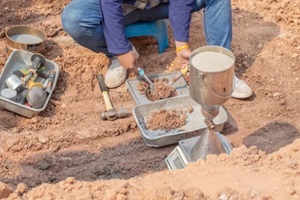 Sand is an essential ingredient in infrastructure projects, forming the foundation of bridges, roads, and buildings. With infrastructure development booming in Florida, having stringent sand standards is essential. That’s where Florida’s Department of Transportation (FDOT) comes in.
Sand is an essential ingredient in infrastructure projects, forming the foundation of bridges, roads, and buildings. With infrastructure development booming in Florida, having stringent sand standards is essential. That’s where Florida’s Department of Transportation (FDOT) comes in.
FDOT has developed comprehensive specifications for construction sand, ensuring only the highest quality aggregates are used to build and maintain Florida’s transportation network.
This article will explore FDOT’s rigorous sand standards and how they enable the creation of durable infrastructure that stands the test of time.
Ensuring Strength and Purity
FDOT’s specifications lay a strict foundation for the composition and characteristics of sand used in construction projects. At the most basic level, sand particles must be hard, strong, and durable. This prevents weaker particles from being incorporated into concrete where they could compromise overall strength.
FDOT also limits deleterious substances such as clay, coal, and organic materials. For instance, clay content is restricted to just 1% by weight. The presence of these impurities could reduce the sand’s performance or make it unsuitable for construction use.
Extensive testing procedures such as sieve analyses, organic impurity evaluations, and durability assessments help guarantee sand purity.
Controlling Construction Sand Gradations for Versatile Applications
Not all sands are created equal — their unique gradations make certain types better suited for specific applications. FDOT recognizes this and has developed detailed particle size distribution requirements tailored to their end-use.
For general silica sand, anywhere from 3% to 75% of particles must fall between the No. 16 and No. 30 sieves. This range makes the sand widely suitable for use in concrete production.
More specialized sands, such as those used for masonry brickwork, are exempted from strict gradation standards but must still fall within a workable size distribution.
Uniform gradations also enable the optimization of sands for particular infrastructure projects. Contractors can dial in particles that will achieve maximum strength and stability. FDOT’s standards include allowances to modify gradation specifications if needed for customized particle profiles.
Vetting Performance for Critical Strength
 In infrastructure construction, weak links in material strength can lead to catastrophic failures. FDOT leaves no room for substandard structural integrity, mandating batteries of assessments to validate sand performance.
In infrastructure construction, weak links in material strength can lead to catastrophic failures. FDOT leaves no room for substandard structural integrity, mandating batteries of assessments to validate sand performance.
For silica sand, tests such as AASHTO T21 and AASHTO T71 gauge the effects of organic impurities on sand’s capacity to produce strong concrete. Sand for use in concrete must meet minimum mortar strength ratios of 95% to ensure suitable durability.
Across all sands, FDOT bases standards on research into real-world performance on past projects. Ongoing monitoring means specifications evolve to incorporate new learnings. This prevents any degradation of quality as construction needs and methods change.
With public safety at stake, FDOT’s rigorous validation protocols ensure only the strongest sands make the cut.
Specialized Standards for FDOT Construction Sand
Infrastructure construction demands sand for much more than just concrete production. FDOT recognizes this by providing specialized specifications for unique applications such as masonry, pipe joints, riprap, and underdrain filters.
For example, sand used in pipe joints must be reasonably free of organic matter, but gradation requirements are waived since particle sizes don’t impact performance. Meanwhile, sand for riprap has defined gradation limits to achieve optimal erosion resistance and stability.
FDOT’s standards for specialty sands enable them to serve their specific purposes while still meeting baseline durability criteria. This dichotomy of standardized quality and customizable specifications provides the flexibility to utilize the right sand everywhere.
Incorporating Recycled and Local Materials
With environmental stewardship growing in importance, FDOT aims to maximize recycled content and local sourcing of construction aggregates. Their specifications allow substitutions such as recycled concrete screenings instead of silica sand for some applications.
Local sand materials only need to meet basic composition and gradation requirements, which lowers barriers for small producers. While FDOT maintains rigorous quality control standards for all construction sands, they do recognize opportunities to incorporate sustainable practices such as recycled and locally sourced materials when it makes sense based on performance requirements.
These provisions also enable more cost-effective infrastructure construction, keeping taxpayer dollars in check. Optimizing for recycled and local materials where possible helps projects stay on budget without compromising safety and longevity.
Building a Legacy with Quality FDOT Construction Sand
When you combine all of FDOT’s specifications into a cohesive set of standards, they provide a guiding light for construction sand use. Following their stringent guidelines ensures that large infrastructure projects start off on the right foot, founded upon high-performing, durable sands.
 Over time, the high-quality aggregates specified by FDOT help confer durability and strength to the concrete and asphalt used in Florida’s transportation infrastructure.
Over time, the high-quality aggregates specified by FDOT help confer durability and strength to the concrete and asphalt used in Florida’s transportation infrastructure.
The rigorous testing protocols enforced by FDOT ensure that roads, bridges, and other structures built with these compliant construction sands will reliably serve residents and visitors for many decades into the future.
Achieve Full FDOT Compliance with Barclay Earth Depot
Barclay Earth Depot has extensive experience providing top-quality construction sand for clients across Florida. Our advanced processing technology and meticulous quality control procedures produce aggregates that meet FDOT’s exacting standards.
Contact us today at (941) WE-DIG-IT or online to discuss sourcing strong, safe sand optimized for your next infrastructure project.

